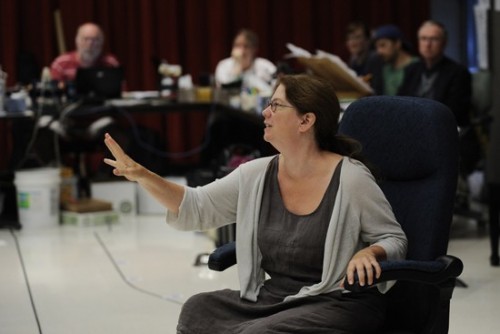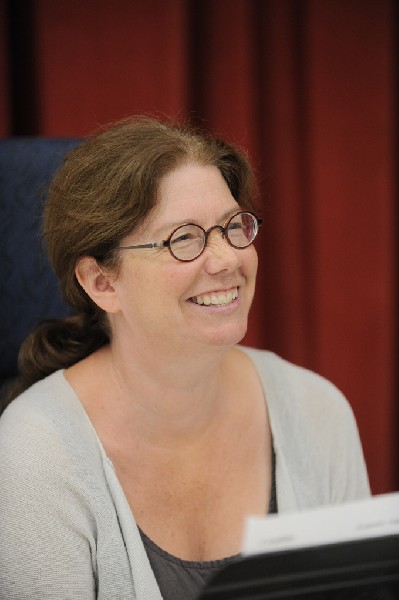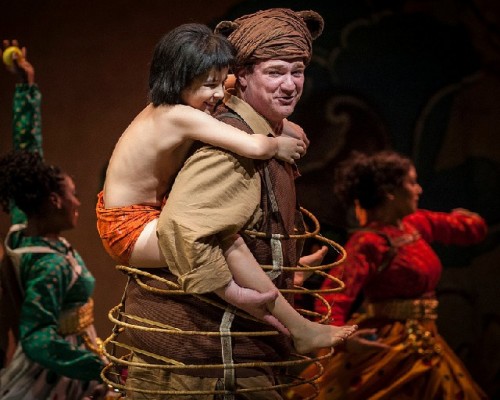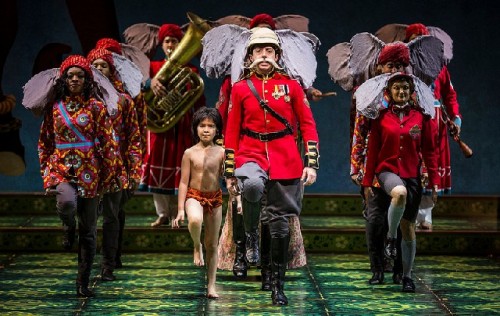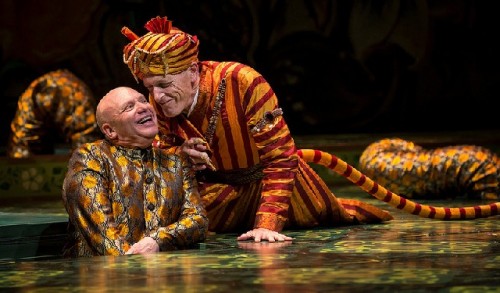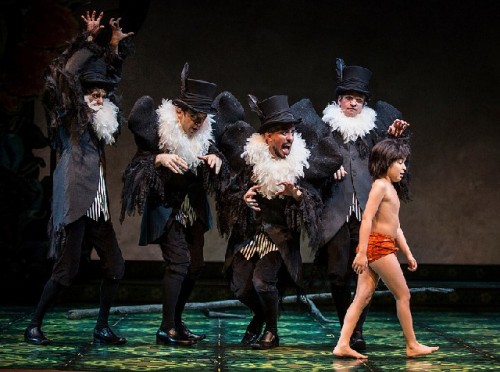A Dialogue with Creator/ Director Mary Zimmerman
Bringing Jungle Book from Chicago to Huntington Theatre Company
By: Charles Giuliano and Mary Zimmerman - Sep 03, 2013
Launching the fall season Huntington Theatre Company opens with the Mary Zimmerman adaptation of a musical based on Rudyard Kipling’s Jungle Book. Previously for Huntington she adapted and directed the Leonard Bernstein musical Candide.
We interviewed her about Candide as well as her work with the Metropolitan Opera Company which is ongoing. She told us why she doesn't read her reviews. This summer we engaged in an e mail dialogue about the musical which opens in Boston on 7 September.
Charles Giuliano I was surprised that you premiered this new work Jungle Book at the Goodman Theatre rather than Lookinglass. I had thought you were an associate artist of Lookinglass. A colleague commented that in Chicago everyone works with everyone. If that’s true can you tell us how that works and what are the benefits?
Mary Zimmerman Oh, of course we all work together! Why wouldn't we? My two artistic homes in Chicago are the Goodman and Lookingglass -- and Northwestern University is a third home to me as well. I'm not on the administrative side of any of these institutions, so I direct at one place or another as the occasion arises. Some shows feel inherently right for my permanent colleagues and the smaller space at Lookingglass, and some feel more right for the larger space and resources at the Goodman. I am a member of the Lookinglass Company, and an Artistic Associate at the Goodman.
Lookingglass only produces three to four shows a year and so all of its company members often work other places as well. When I work at Lookingglass I feel like the first day of rehearsal is actually the first day of the 20th year of rehearsal, that is how completely at home I am there with a great many of the actors; at the Goodman, I have a similar feeling regarding the staff and the space, but there is no standing acting company at the Goodman, and so that is always a bit more new.
CG What brought you to develop a project using The Jungle Book? What elements seemed attractive to staging it as a musical?
MZ Neither the movie nor our show is a big, ol’ “musical" in the conventional sense with a big opening number and ballads and 24 songs. The movie is a story with six or seven songs, and although our version is highly "musical" and contains more music and songs than the film (and has a twelve piece orchestra), I wasn't looking to make it follow what I understand to be a conventional musical-theatre evening; it is quirkier than that. I wanted to stay true to the simple, sweet, accessible nature of the movie; to its songs -- to the genre of its songs-- and its story. We use all the great jazz, swing and Dixie music from the film and inflect it through Indian musical instrumentation and I think the combination is one of the best things about our show.
I think what most attracted me to the project was the sheer challenge: How to do the jungle? How to do the animals? How to find charming ways to do things that the animation does that are impossible in real life? How to structure to give it some sense of return? I think that the great appeal of the story as it exists in both Kipling and the Disney film is that it is about having to grow up, leave childhood, leave the wild part of ourselves that is closer to the animals. There are benefits in doing that, of course, but there is loss as well.
CG How different is this from reworking Leonard Bernstein’s Candide? You also directed that for the Huntington Theatre Company.
MZ There are certain similarities. Both shows are descendants of literary texts (Voltaire's Candide and Kipling's Jungle Book), that have passed through other performance forms (other musical versions of Bernstein's Candide, and the Disney film of Jungle Book) that are radically different in tone from those original literary sources. I had thought the tonal difference between Bernstein's Candide and Voltaire's to be large, but it is nothing compared to the difference between Kipling and Disney.
In both cases I wanted to harken back to the original literary source for inspiration, for structural ideas, for images and metaphors, and to enrich the musical (or film) text. In the case of Jungle Book, as I worked on it in rehearsal, my grand ideas about incorporating more of Kipling's stories fell away somewhat. I do have a few Kipling poems in there, and some of the gravity and melancholy of the stories is in there, but I had originally planned to incorporate much more of the various plots of the Kipling, and as we went on, it just didn't feel right. The music from the film is so very joyous, and that is what I followed.
What I did draw from Kipling, in a way that I hope is subtle, was actually from his biography. Kipling was born in India to parents who had emigrated from England. His father was an artist and an art instructor. At the age of eight, when his sister Trixie was four, Kipling's parents took the children to England for "a visit." They were brought to a sort of boarding house/school and in the middle of the night, his parents woke him up to say good-bye and abandoned him and Trixie to this place for their education.
For the next several years, the children were abused and terrorized to the point where one of their British relatives wrote to their parents saying, "You have to come and get Ruddy, something has gone wrong." He was repeatedly running himself into walls, banging his head to knock himself unconscious. Rudyard was brought away, but Trixie was left, and she didn't really survive it. She ended up institutionalized in later life. Kipling wrote about all this in both his fiction and in his autobiography. And importantly -- for me -- he writes about how what saved him in childhood, there in rainy England, was reading. Fiction and reading. He writes about how it carried him away, transported him, and was responsible for all the happiness in his life.
Kipling is everyone's favorite black sheep Colonialist, and he deserves that reputation in most ways. But he came by his Jungle Book fantasy of India quite honestly. For him, as a child, it was truly a paradise lost and regained through the imagination. Most people don't know that Kipling wrote the Jungle Book stories while living in Vermont. That's another story.
CG Mostly Jungle Book is regarded as a tale for children. In what manner do you see this as for children of all ages? Is this your answer to The Lion King?
MZ Kipling's Jungle Book is quite dark, actually, quite full of vengeance, violence and domination and blood and so on. The film is a different matter of course, full of joy and sweetness. As always, in making the show, the only audience I thought about was myself and a few other trusted colleagues, my designers, my collaborators. My belief is that I am a human being and therefore must have something in common with other human beings, and I want to make the show that enchants me and I hope (very much) that it will enchant others. I think if something is beautiful, if it contains ideas that are interesting and perhaps true, if it creates feeling and understanding in the audience, then it will appeal to all, even if it is a relatively simple tale. I hope the show is for the child that is latent in the adult and the adult that is nascent in the child.
CG Now that the premiere production has been frozen what insights have you derived from the first production? Since it will soon transfer to Boston and the Huntington Theatre Company what changes may we anticipate?
MZ I do look to make some trims and perhaps rework the opening musical passage of the show. We'll see. That said, I hope that a show is never completely frozen. The audience changes it from night to night and, notably, in our show, the musical solos are improvised every night -- different every single night. They are a certain number of bars long, because they are being danced to, but what our beautiful trumpet, trombone, clarinet, violin, saxophone, sitar and tabla players and others do every night in those passages is 100% up to them.
CG Boston and Huntington appear to be a home away from home for you. When we last discussed the production of Candide you talked about delaying the start of your teaching semester in Chicago. I am assuming that will again be the case. Is there a pattern here? Are other projects under discussion in a similar format and time frame? Do you own September in Boston?
MZ l love Boston, of course. I love the streets, the scale of it, the feel of it. I truly love the Huntington’s mainstage theatre, it's old-timey feel -- the beautiful light fixtures under the balcony, the small wood wainscoted lobby, etc. It is full of character. Plus, all the personnel is great: great crews, great shops, great administration. I knew that I wanted to come to another theatre after Chicago because with Candide I really did learn a lot as the show went on. In Boston, Candide reached a kind of nirvana for me, and to this day I say to people, "You should have seen it by the time it got to Boston!" It was 22 minutes shorter than it had been in Chicago, and had a closing speech by Candide that (I can't believe) wasn't in the original production. However, in the case of Candide we had months and months between productions, and an intervening production in Washington, DC at the Shakespeare Theatre as well. With Jungle Book we are basically closing in Chicago, throwing it in a truck and hurtling to Boston as fast as we can.
CG There is buzz that this production is headed to New York. Is there anything you can disclose at this time? Of course it is terribly difficult to bring expensive musicals to Broadway. Since we no longer have the old out of town tryouts it now seems ever more difficult. The trend has been for long previews, rarely enough time, and then an opening. For Spiderman the previews lasted for months.
Developing plays first in regional theatres, then New York, seems to be a viable alternative. ART has done that successfully with Porgy and Bess as well as Pippin. Williamstown Theatre Festival developed Far from Heaven for Off Broadway and is now in production with a New York bound musical Bridges of Madison County.
Is that what’s going on with Jungle Book?
MZ Honestly, one of the biggest challenges in doing this show is to pay no attention whatsoever to any buzz about its future life; to keep my eye on the story and how to best express it rather than any sense of expectation about it. Nor to give it any special sense of importance beyond the seriousness (for me) of my having been given the chance to work with one of the great pieces of American popular culture -- the Disney film -- and with one of its great geniuses, Richard Sherman (which has been a dream). That has been my policy from the beginning.
CG Are there updates for your ongoing projects for the Metropolitan Opera? Is there anything else in the works?
MZ Well, the big news is, I suppose, that our Lucia di Lammermoor is going to La Scala. I was just in Milan with Dan Ostling -- set designer for that and Jungle Book -- for meetings on that. That happens in February 2014. I have also the revival of Sonnambula in March at the Met. There are talks about other things, but nothing to report.
CG Given the high stakes and staggering expenses of musicals on Broadway are producers playing it safe with so many revivals? What is the wiggle room and risk factor for new works? Even Pippin, arguably, was a revival.
MZ I am so very unqualified to address this question. It's not my world, really.
CG Can you talk about working with Sherman, now in his 80s on this show? What was the essence of your relationship and collaboration?
MZ Meeting and working with Richard Sherman was one of the chief delights of this whole project for me. He is amazingly vital, engaged and a fantastic positive force. He came to Chicago for our second music workshop and for a few days each at the beginning, middle and end of our rehearsal process. We went to Richard for help with repurposing an old trunk song of the Sherman Brothers for the show and he wrote entirely new lyrics. He was just invaluable as a colleague. He's a deeply sensitive and loving man and his support of the show has been total. I adore him -- as does anyone who meets him.
CG You went on location in India to find connections with Kipling’s Jungle Book. This appears to be an aspect of your process. How did it impact this production?
MZ It wasn't so much to find connection with Kipling's biographical India, but rather to experience Indian forms of representation first hand -- in music, painting, dance, all forms of artistic representation. To look for inspiration for our own embodiment on stage of this wholly imaginary jungle. It was a conscious question with us for our travels: are we looking to see actual Indian animals and nature, or representations of them? It was both. The visit, like our visits to other places on other projects informed every aspect of the show.
There are dozens of examples. One is the elaborate, carved swings we saw in palaces and fancy places. They are used in our show as a way of being "up in the trees." The ubiquity of marigolds as ornament for all kinds of ceremonies served as inspiration for how to represent fire in the stories -- which is always called the "red flower." In Jaipur we heard "serpent trumpets" played in a very striking rhythm that heralds the arrival of elephants, and we ended up procuring two of these trumpets to use in our Colonel Hathi scenes. There was a painting of a demon I saw in a museum in New Delhi that we copied almost exactly for Shere Khan's costume. Mostly we gathered with our eyes and ears, but we also made a few purchases -- some antique silk borders that were used in the wolves costumes, for instance. Doug Peck, our music director, spent serious time at the annual music festival in Chennai learning all he could not only about the aesthetics of various forms of Indian music, but practical things as well -- how the instruments are mic-ed and so forth.
A secret purpose for me of these trips is that it takes the team out of its ordinary life and crams us all together in a mini-van for 10 days or so, and all we talk about, night and day, is the show: what we are seeing every day and how it might relate to our own story-telling. We go from dawn to midnight absorbing things and reflecting on them and getting new ideas.
Review of Jungle Book.

